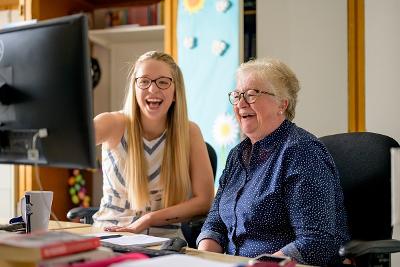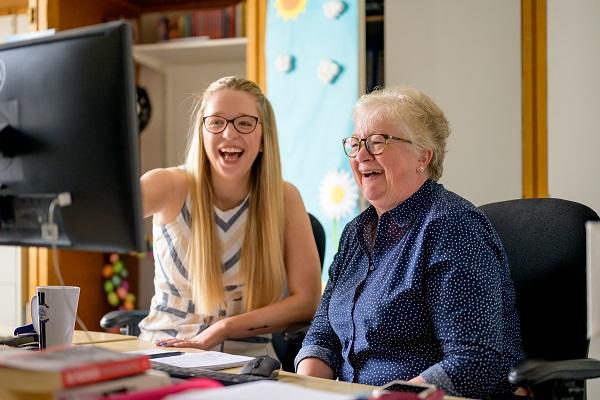International Women's Day 2024: Hearing from our Adult Social Care service

As part of our International Women's Day activities this year and shining a light on those doing incredible things across Gateshead, we sat down with our Adult Social Care team to discuss the vital role women play in delivering their service.
"What role do women play in delivering Adult Social Care's services and what is their impact?"
Care as a profession is heavily dominated by women. Our Adult Social Care service at Gateshead is no different - nearly 83% of our workforce are women, and this is representative of the social care workforce in general.
Given that women make up so much of our workforce, it is hard to summarise just how much they do every day for those who need us within the borough. We have women social workers keeping people safe, women enablement workers supporting people to become as independent as possible, women commissioners overseeing care services, women occupational therapists providing therapeutic and adaptive interventions, and women support workers providing essential, person-centred care. This list could go on.
We're very proud that lots of senior roles within our service are held by women. It's powerful to have so many women in management roles who are not only leading change within the sector, but paving the way for others to follow in their footsteps. In less female-dominated industries, or even care services outside of the council, we know that this is not always the case.
Many of our colleagues feel glad to be part of a profession where women employees have their voices heard and where there's support in place to enable them to progress, like having access to flexible working options, training and support relating to the menopause, and much, much more.
International Women's Day also provides a great opportunity to reflect on female pioneers in health and care, such as Florence Nightingale, Marie Curie and more locally Sister Winifred Laver, a nurse and Methodist Deaconess who devoted her entire life to combating inequality in Gateshead until her death at age 92 in 1980. This year, we are opening the Sister Winifred Laver Promoting Independence Centre named in her honour.
"What are your hopes for what the sector might look like in 5 or 10 years' time? How might we continue to support women working in adult social care?"
Perhaps the main thing we would want for the profession in the future is for it to be more valued. As we've already shared, our Adult Social Care service do amazing things day-in-day-out, but we don't always get much recognition for what we do - perhaps because we're a female-dominated profession.
Of course, this change isn't going to happen overnight as it's a systemic issue, but there are steps everyone can take to help give our sector more recognition. One of these is thinking about the language we use when talking about care, and assuming that care workers are female - this creates an expectation that only women do this job which, unintentionally, can feed into a gender bias where women are seen as 'soft and emotional'...whereas we would say we are tough and emotionally intelligent!
We also want to do more to ensure that our service is a place where all women can thrive in the workplace and to welcome greater diversity.
Though of course we're celebrating the contributions of women here, we would also like to encourage more men to consider roles in social care - they have a lot they could bring to the profession too.

As part of our International Women's Day activities this year and shining a light on those doing incredible things across Gateshead, we sat down with our Adult Social Care team to discuss the vital role women play in delivering their service.
"What role do women play in delivering Adult Social Care's services and what is their impact?"
Care as a profession is heavily dominated by women. Our Adult Social Care service at Gateshead is no different - nearly 83% of our workforce are women, and this is representative of the social care workforce in general.
Given that women make up so much of our workforce, it is hard to summarise just how much they do every day for those who need us within the borough. We have women social workers keeping people safe, women enablement workers supporting people to become as independent as possible, women commissioners overseeing care services, women occupational therapists providing therapeutic and adaptive interventions, and women support workers providing essential, person-centred care. This list could go on.
We're very proud that lots of senior roles within our service are held by women. It's powerful to have so many women in management roles who are not only leading change within the sector, but paving the way for others to follow in their footsteps. In less female-dominated industries, or even care services outside of the council, we know that this is not always the case.
Many of our colleagues feel glad to be part of a profession where women employees have their voices heard and where there's support in place to enable them to progress, like having access to flexible working options, training and support relating to the menopause, and much, much more.
International Women's Day also provides a great opportunity to reflect on female pioneers in health and care, such as Florence Nightingale, Marie Curie and more locally Sister Winifred Laver, a nurse and Methodist Deaconess who devoted her entire life to combating inequality in Gateshead until her death at age 92 in 1980. This year, we are opening the Sister Winifred Laver Promoting Independence Centre named in her honour.
"What are your hopes for what the sector might look like in 5 or 10 years' time? How might we continue to support women working in adult social care?"
Perhaps the main thing we would want for the profession in the future is for it to be more valued. As we've already shared, our Adult Social Care service do amazing things day-in-day-out, but we don't always get much recognition for what we do - perhaps because we're a female-dominated profession.
Of course, this change isn't going to happen overnight as it's a systemic issue, but there are steps everyone can take to help give our sector more recognition. One of these is thinking about the language we use when talking about care, and assuming that care workers are female - this creates an expectation that only women do this job which, unintentionally, can feed into a gender bias where women are seen as 'soft and emotional'...whereas we would say we are tough and emotionally intelligent!
We also want to do more to ensure that our service is a place where all women can thrive in the workplace and to welcome greater diversity.
Though of course we're celebrating the contributions of women here, we would also like to encourage more men to consider roles in social care - they have a lot they could bring to the profession too.
